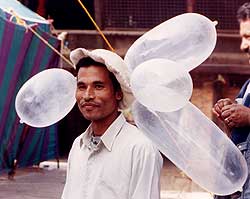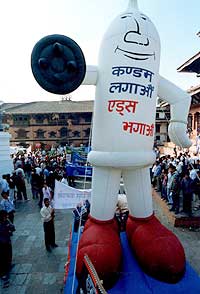
US president George W Bush's decision to reinstate the "Global Gag Rule" that prevents NGOs from providing abortion-related services, including counselling and referrals, has started affecting projects that aim to improve the reproductive health of Nepalis.
AIDS is going to be the single biggest killer of young Nepalis in the next five years and is spreading rapidly because of unprotected sex and injecting drug use. Nepal also has one of the highest maternal mortality rates in the world mainly due to lack of health care and unsafe abortions.
One estimate two years ago showed that at least six Nepali women die every day because of unsafe abortions. There are still hundreds of women in jails serving sentences for abortion, three-fourths of them are illiterate and have never received legal support. Legalised abortion would make it safer and also help women in prison, but such reforms and legal services will be jeopardised if American funding dries up.
"We are concerned about US funding," says Wasim Zaman, the Kathmandu-based South Asia director of the United Nations Population Fund (UNFPA). "They should be taking the lead, not slowing down. This is not about supporting abortion, it is about population, development and safe motherhood."
UNFPA was hit hard after the US cut its funding during the Reagan years, citing money was used for abortions in China. The Clinton administration reinstated funding, but when George W Bush came to power the bill was once more blocked in Congress under pressure from the religious right. Like the UNFPA, the London-based International Planned Parenthood Federation (IPPF), which campaigns for women's reproductive rights all over the world, has also had its US-funding cut off and it has scrapped some of its support for local affiliates.
At the fifth Asia-Pacific Conference on Population and Development in December which was supposed to take stock of progress since the Cairo conference in 1994, the US delegation tried to block two chapters in the resolution dealing with reproductive rights, especially for adolescents because "it would lead to abortions".
Although the US was isolated, it did mange to put pressure on countries like Nepal and Sri Lanka to abstain from the final voting.
Last August, after intense lobbying by health and social activists, Nepal's parliament passed a bill with an overwhelming majority, conditionally legalising abortion under strict consensual and health guidelines.
 Now, some of these NGOs face cuts in US funding. The Family Planning Association of Nepal (FPAN) has been supported by the US government for the past 30 years, and had been getting $430,000 annually till 2001. That support has been cut. In addition, funding from the IPPF suffered a 23 percent cut when the US stopped funding its London headquarters. The cuts have affected FPAN's contraceptive procurement as well as awareness activities, and the association has also laid off 70 experienced staff and slashed other expenses.
Now, some of these NGOs face cuts in US funding. The Family Planning Association of Nepal (FPAN) has been supported by the US government for the past 30 years, and had been getting $430,000 annually till 2001. That support has been cut. In addition, funding from the IPPF suffered a 23 percent cut when the US stopped funding its London headquarters. The cuts have affected FPAN's contraceptive procurement as well as awareness activities, and the association has also laid off 70 experienced staff and slashed other expenses. "Nepal is a success story, there is very high awareness about the contraceptive and AIDS-prevention aspects of condoms. Now, all this could go down the drain," warns Nirmal Kumar Bista of FPAN.
Nepali health activists say Washington could face a harsher reaction from the American public if they were told what the US aid pullout is doing to mothers and children around the world. When asked, USAID's health expert Pancha Kumari Manandhar told us: "The US Congress has heard the views of Nepali NGOs, but a policy changed is not being considered at this moment."
Pro-choice organisations like Centre for Reproductive Law and Policy are therefore trying to generate public pressure from within the US. "The American people haven't been told about the negative impact Bush's decision has made on family health services and AIDS prevention in countries like Nepal," says FPAN's Bista.
US aid officials based in Kathmandu admit privately that they were embarrassed and worried by their government's stance, but said there wouldn't be a shortage of donors if the US pulled out. Other donors said it was the principle of the thing. "The Europeans are doing a good job, but they shouldn't be asked to fill in," one aid official in Kathmandu told us.
At the Ministry of Health's Family Planning Division, Laxmi Raj Pathak says there already is a negative impact, but added, "It's not going to affect our policy on safe abortion and contraceptive awareness and distribution."
The US decision has not only upset activists and lobbyists, but has also irked policy makers. Sharat Singh Bhandari who was the outspoken health minister in the Deuba government told us, "We respect the US' right to decide its own policies, but we urge it to take a wider perspective in issues that might have global impact and implications." While minister, Bhandari battled social taboos about discussing sex and was embroiled in controversy for advocating the legalisation of prostitution. He added, "Our present reality demands that women should be given a right to decide what happens to their bodies and how they want to plan their families. We should keep politics out of it."


